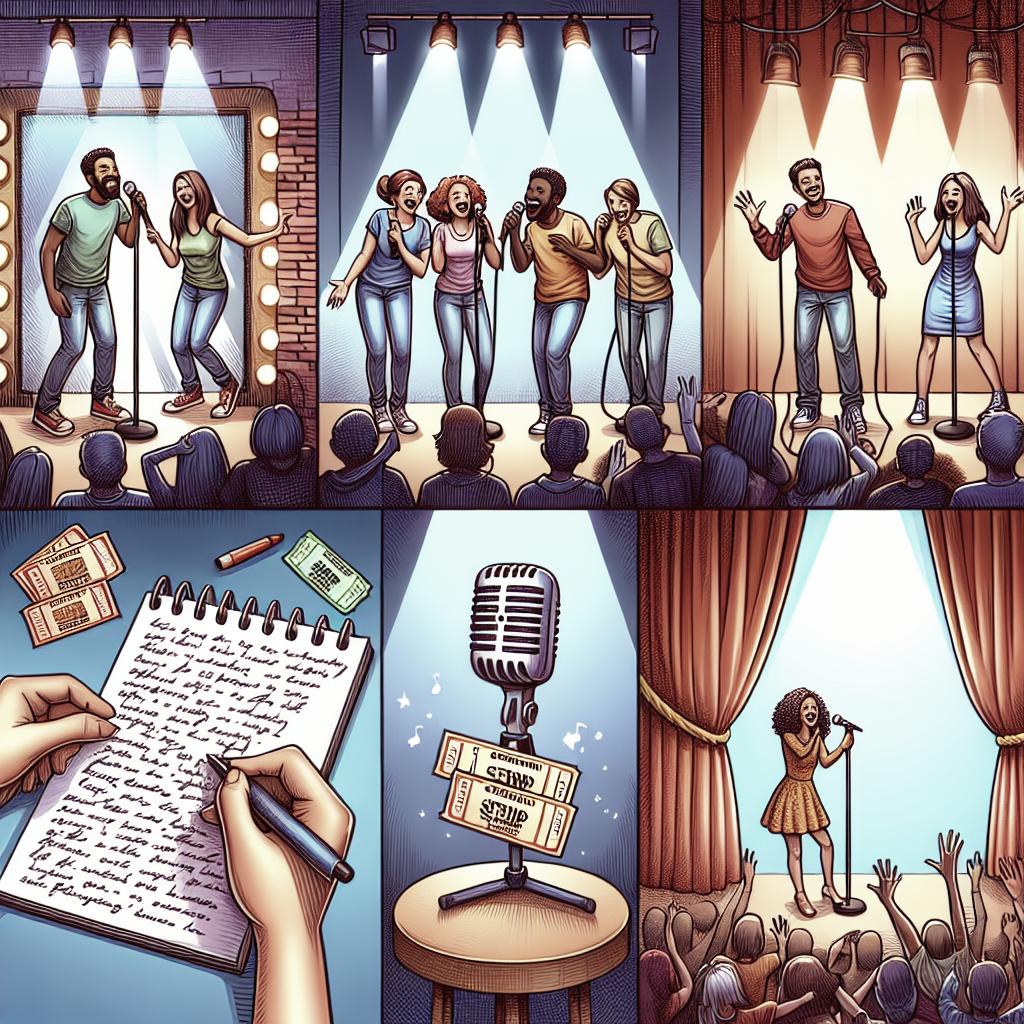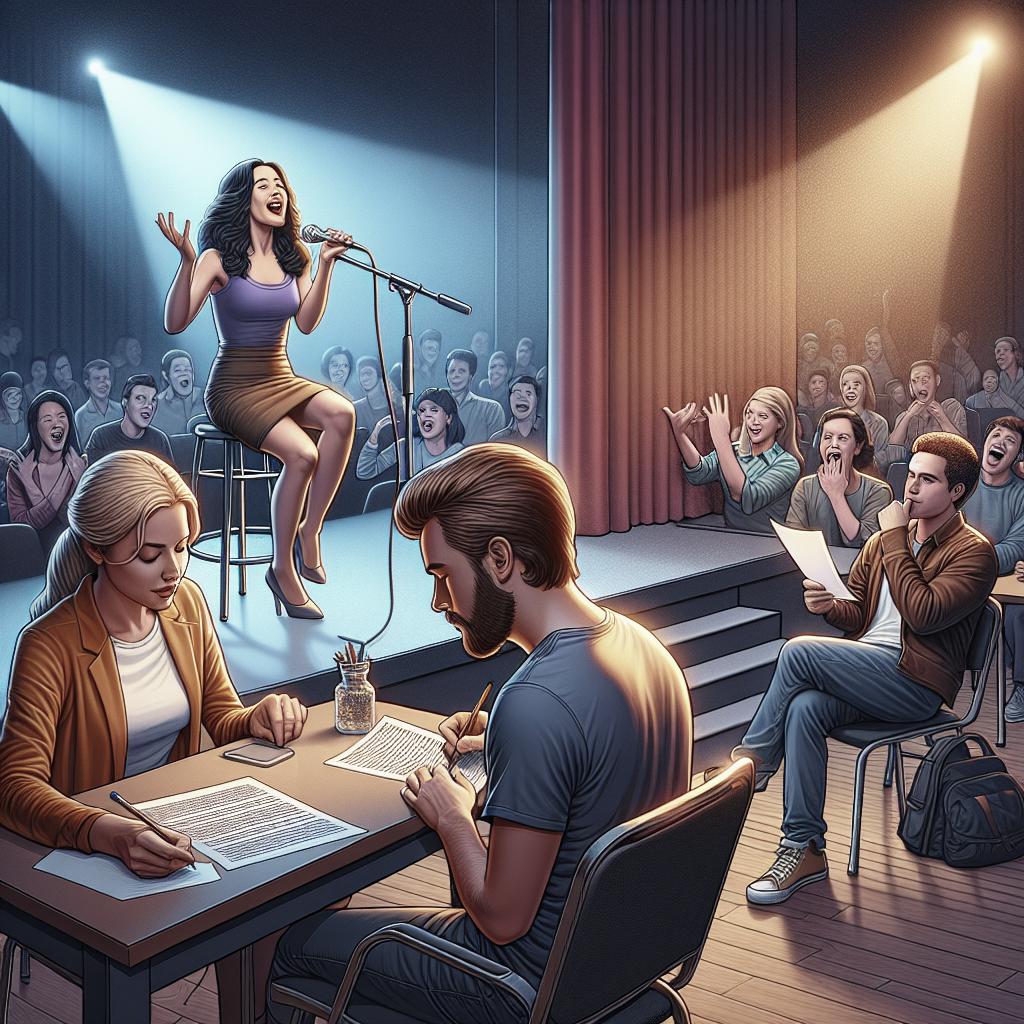My Own Journey: Learning How to Be a Comedian
My journey into comedy was anything but conventional. Growing up, I found myself fascinated by how humor could transform awkward situations into memorable anecdotes. I wasn’t a class clown, but I appreciated clever humor and wordplay. My formal entrance into the world of comedy began in college, where I joined an improv group and participated in open mic nights. Initially, my jokes were met with awkward silences and forced chuckles. It was a humbling experience, but it also piqued my interest in the mechanics of comedy. I realized early on that writing and performing comedy are two sides of the same coin. I took online courses, read countless books on comedy writing, and sought mentorship from seasoned comedians. These experiences enriched my understanding and sharpened my comedic skills. Eventually, I found my voice: observational humor paired with a dash of absurdity. This journey has been about constant learning, facing rejection, and above all, staying true to myself.
Where Many Aspiring Comedians Fail When Learning How to Be a Comedian
It’s easy to think that being funny is a talent that you either have or don’t. However, like any art form, comedy requires practice, persistence, and a deep understanding of human nature. One key area where many aspiring comedians falter is in joke construction. Novices often fail to recognize the importance of structure in comedy, such as setup, punchline, and timing. A poorly structured joke will almost always fall flat, regardless of how funny the core idea might be. Another common pitfall is over-reliance on clichés and recycled material. It’s tempting to mimic successful comedians, but audiences can quickly sense when a joke lacks originality. This borrowed humor often feels forced and can lead to audience disengagement. To be truly memorable, a comedian needs to offer a unique perspective rather than rehashing what’s already been said. Many aspiring comedians also forget the importance of resilience. The path to becoming a comedian is rife with rejection and criticism. Bombing on stage is an inevitable part of the journey. It’s easy to get discouraged and give up too soon. Learning to bounce back from failures, take feedback constructively, and continuously refine your material is crucial for long-term success in comedy.
Be Your Natural Self
Authenticity is a critical component of being a successful comedian. Audiences are perceptive and can quickly tell when someone is being fake or trying too hard. This authenticity often comes from personal experiences and genuine emotions that resonate with the audience. Moreover, when you are your natural self, your delivery is more relaxed and confident, which makes your comedy more effective. One practical way to be authentic is to incorporate personal stories into your routine. This doesn’t mean you have to bare your soul on stage, but sharing relatable anecdotes can build a connection with the audience. For instance, rather than making generic jokes about airport security, I might share a humorous but real experience about the time I was mistaken for a famous celebrity during a routine security check. One of the best pieces of advice I received was to “play to the top of your intelligence.” This means bringing your full self to the performance—your unique observations, quirks, and intellect. Being authentic doesn’t mean you have to be serious all the time, but it does mean that your humor should reflect who you genuinely are. The audience is more likely to connect with and remember a comedian who offers a fresh, authentic perspective.
The Problem With Unnatural Behavior When Writing Comedy
Trying to be someone you’re not is a recipe for disaster in comedy. Unnatural behavior when writing comedy often leads to a disconnect between you and your material, which the audience will notice. For instance, if you are naturally more laid-back and contemplative, trying to perform hyper-energetic, slapstick humor may not align with your strengths and could come across as inauthentic. Another problem with unnatural behavior is that it stifles creativity. When you’re focused on being someone else, you aren’t drawing from your own well of experiences and insights, which are the richest sources of humor. This limitation can make your comedy feel stale and derivative. In the long run, audiences are more likely to embrace comedians who offer fresh, authentic perspectives rather than those who mimic existing styles. This misalignment can also lead to poor delivery. When your material doesn’t match your natural demeanor, it’s challenging to deliver it convincingly. Comedians need to be comfortable in their skin to deliver jokes effectively. Forced humor often results in awkward pauses, flat punchlines, and, worst of all, a disengaged audience. In the end, trying to be someone you’re not does more harm than good in comedy.
A Hypothetical Situation
Imagine you’re an aspiring comedian with a passion for dry wit and clever wordplay, but you observe that slapstick humor is trending. Attempting to write and perform in a slapstick style you’re not comfortable with will likely result in strained performances and unenthusiastic audience reactions. Your delivery might come off as awkward because it doesn’t align with who you are. In this hypothetical scenario, instead of chasing trends, lean into your natural strengths. Focus on crafting sharp, witty jokes that showcase your unique sense of humor. Perform in venues that appreciate your style, and avoid comparing your journey with those who are successful with different comedic approaches. Authenticity will help you build a more genuine and lasting connection with your audience. By staying true to your comedic style, you’ll not only perform better but also enjoy the creative process more. Audiences can sense when a performer is comfortable and confident on stage. Your natural humor, well-refined and delivered authentically, will resonate more deeply and leave a lasting impression.
Being Your Naturally Funny Self
The key to being your naturally funny self lies in understanding what makes you laugh and why. Reflect on the humor around you, from the jokes shared among friends to the types of comedy shows you enjoy. Your natural style will often align with these preferences. Once you identify this, the next step is to channel it into your writing and performances. While it’s essential to study the mechanics of joke construction, don’t lose sight of what makes your humor unique. Your personal quirks, observations, and life experiences are what will distinguish you from others. For instance, if your friends often laugh at your quick wit or sarcastic comments, those are elements to incorporate into your comedy routines. Practice is also vital in discovering and refining your natural comedic voice. Regularly perform at open mic nights or record yourself practicing at home. This allows you to experiment with different styles and see what resonates most with an audience. Over time, this iterative process will help you hone in on your natural comedy style and become more comfortable and confident in your delivery.
Lessons Learned
| Section | Key Points |
|---|---|
| My Own Journey: Learning How to Be a Comedian | Personal experiences, early struggles, importance of continuous learning and staying true to personal voice. |
| Where Many Aspiring Comedians Fail When Learning How to Be a Comedian | Significance of joke structure, originality, resilience, and handling rejection. |
| Be Your Natural Self | Importance of authenticity, connecting with the audience, and playing to your strengths. |
| The Problem With Unnatural Behavior When Writing Comedy | Issues with inauthenticity, stifled creativity, and poor delivery. |
| A Hypothetical Situation | Scenario of trying to follow trends versus staying true to personal comedic style. |
| Being Your Naturally Funny Self | Identifying personal humor, practicing regularly, and refining comedic voice. |


